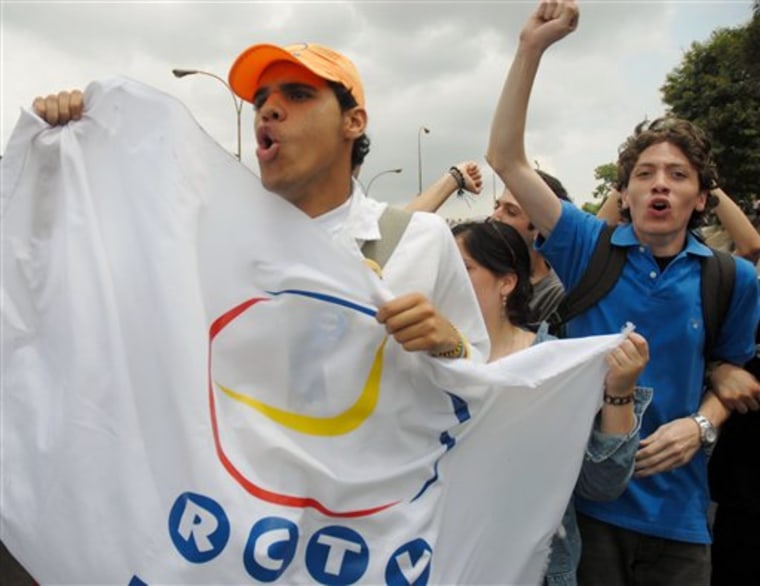Tens of thousands of Venezuelans took to the streets Saturday chanting “Freedom, Freedom!” to protest President Hugo Chavez’s decision not to renew the broadcast license of the country’s most-watched TV station, an outlet for the opposition.
Police lined a Caracas avenue while the protesters paraded past, some holding signs reading “No to silence,” while others placed tape over their mouths.
Radio Caracas Television, the sole opposition-aligned TV station with nationwide reach, is due to go off the air at midnight Sunday. Protesters say that by not renewing RCTV’s license, Chavez is attempting to silence critics of his leftist government.
“Our president wants to control everything, even what we watch on television, so his voice is the only voice on the airwaves,” said Roger Montoya, a 23-year-old university student at Saturday’s march. “It’s totalitarianism.”
Chavez says station supported coup
Chavez defends the decision as a legal move to democratize the airwaves by turning over RCTV’s signal to a public service channel. The president and his supporters have accused RCTV of supporting a failed 2002 coup against him, violating broadcast laws and regularly showing programs with excessive violence and sexual content.
In one downtown Caracas plaza, hundreds of red-clad Chavez supporters gathered in front of a large television screen, where alleged violations by RCTV were replayed as the words, “Tell the truth,” rolled across the screen.
Founded in 1953, RCTV broadcasts a mix of talk shows, sports, soap operas and the popular comedy program “Radio Rochela,” which often pokes fun at Chavez.
A popular leader at odds with the United States, Chavez was re-elected in December by a wide margin. The opposition has seized on the RCTV controversy to revive street demonstrations that faded immediately following last year’s election defeat.
Court rules equipment must be handed over
Venezuela’s Supreme Court ruled on Friday that broadcasting equipment used by the channel must be made available to the state-funded channel that will replace it.
The Supreme Court said Venezuela’s telecommunication commission would assume responsibility for RCTV’s equipment, including microwave dishes and antennas, while the court reviews RCTV’s appeal of Chavez’s decision not to renew its license. The court also ordered the military to temporarily guard RCTV’s broadcasting equipment.
RCTV’s general manager, Marcel Granier, said Friday’s high court ruling is the product of “the immense pressure the government has put on magistrates.”
Protesters massed Saturday outside RCTV’s studios, where a huge Venezuelan flag was hung from the building’s roof.
‘A threat to the country’
During a speech that all of Venezuela’s private TV channels were forced to broadcast, Chavez defended his decision.
“That television station became a threat to the country so I decided not to renew the license because it’s my responsibility,” said Chavez.
Backing Chavez’s decision, dozens of protesters with bandanas over their faces held a rowdy demonstration late Friday outside the studios of another opposition-aligned TV station — Globovision — spray-painting the building with pro-Chavez slogans. The vandalism was condemned by the government.
Globovision is the only other major opposition-aligned channel, and it is not seen in all parts of the country. Two other channels that used to be staunchly anti-Chavez, Venevision and Televen, have recently toned down their coverage.
The National Telecommunications Commission said in a statement that it was in the process of renewing licenses for other channels, including Venevision, that expire the same day.
Groups such as Human Rights Watch and Reporters Without Borders have called the government’s move a flagrant effort to silence criticism. The European Parliament and the U.S. Senate both passed resolutions condemning the decision.
